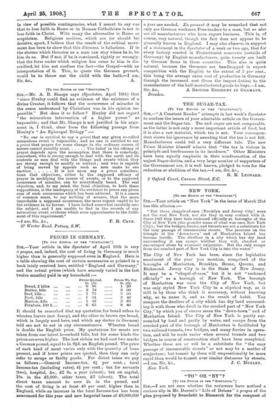PRICES IN GERMANY.
[TO T II II EDITOR OF THE " SF ECTATOR.1
SiR,—Your article in the Spectator of April 18th is very a propos, and, indeed, the cost of living in Germany is much higher than is generally supposed even in England. Here is a table showing the cost of certain necessaries as printed in a book lately received here, entitled "England and Germany," and the actual prices (which have scarcely varied in the last twelve months) paid in my household :— Prices Quoted. m. pig. Prices We Pay. 112. pig.
Bread, 2 kilos ••• 0 58 1 20 Butter, kilo ••• 2 34 3 00 Beef, kilo... • • • 1 75 3 00 Pork, kilo ... • •• 1 34 2 40 Mutton, kilo ... • •• 1 43 2 60 Potatoes, 100 L... ••• 6 65 8 40
It should be remarked that my quotation for bread refers to wheaten loaves (not fancy), and the other to brown rye bread, which is largely used here, and which my doctor (a German) told me not to eat in any circumstances. Wheaten bread is double the English price. My quotations for meats are taken from our latest household bills, but for some kinds the prices are even higher. The last sirloin we had cost two marks a German pound, equal to is. 91d. an English pound. The price of each kind of meat varies only with the quantity of bone present, and if lower prices are quoted, then they can only refer to scraps or faulty goods. For direct taxes we pay as follows :—General Income-tax, 4-/ per cent. ; local Income-tax (including rates), 4+ per cent.; tax for servants (two), hospital, &c., 22 8s. a year (about); tax on capital, 10s. in the 21,000; other taxes, 23 (about). The total direct taxes amount to over 2s. in the pound, and the cost of living is at least 40 per cent. higher than in England, while an increase in the local Income-tax has been announced for this year and new Imperial taxes of 28,000,000
a year are needed. En passant it may be remarked that not only are German workmen Free-traders to a man, but so also are all manufacturers who have export business. This is, of course, very natural, though the fact does not appear to be generally known in England. I may also observe, in support of a statement in the Spectator of a week or two ago, that for every factory erected in Protectionist countries (outside of Germany) by English manufacturers, quite twenty are built by German firms in these countries. This also is quite natural, because the Germans are handicapped in export competition with the English to the extent of 5 per cent., this being the average extra cost of production in Germany through the increased cost (from the import-duties) to the manufacturer of the half-manufactured goods he buys.—I am,






















































 Previous page
Previous page